Working For Fun? What’s Going On With All These Job Simulator Games?
Low-pressure task simulation games speak to how games straddle the line between art and mindfulness.
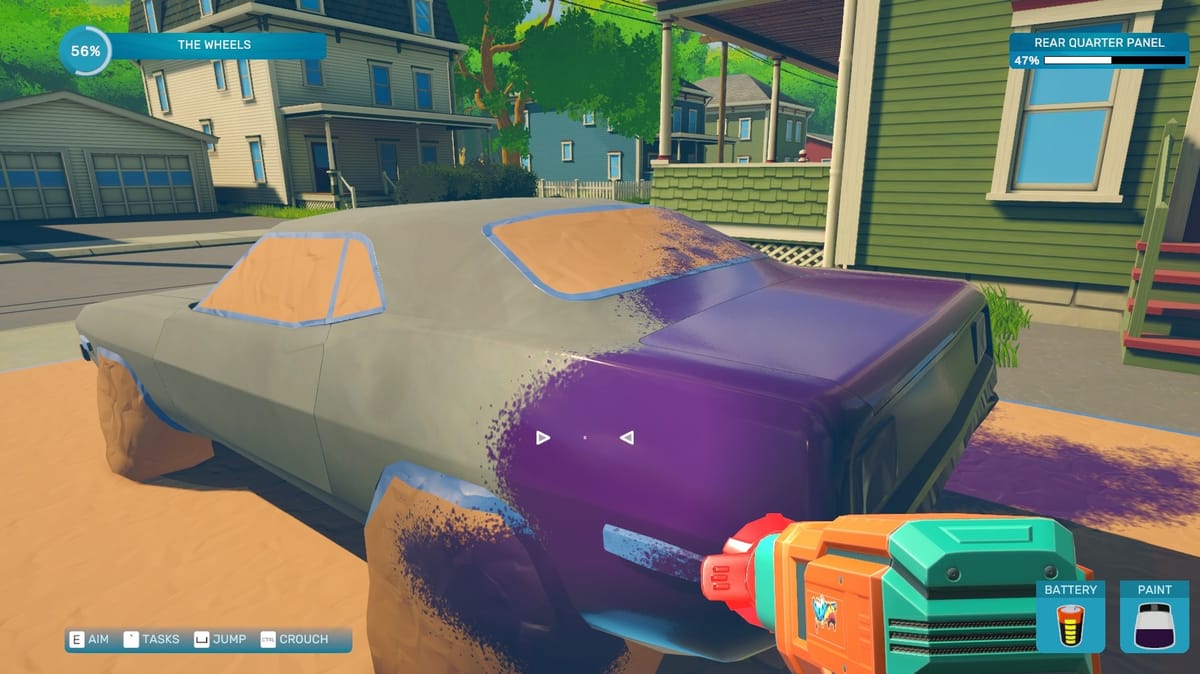
It’s a beautiful Saturday morning in May. The sun is attempting to shine. It’s 6:30 am. I can’t sleep in (the cats won’t let me), so I’m awake, dishes washed, cats fed, coffee beside me. Misty view of the mountains. Maybe I’ll go for a jog this evening. The whole day ahead of me. I want to start off gently, but instead of going outside to the garage to drag some gardening equipment out into the sun, I sit at my computer and fire up… Crime Scene Cleaner?
Last night after dinner, I wanted to unwind before bed, and found myself unaccountably drawn deep into the mind-numbing satisfaction of endless shishhhhhing in Spray Paint Simulator. Watching my little spray nozzle lay down swathes of neon pink and pale yellow on dull dirty walls, to the beat of a nameless jazzy track, was exactly what I wanted to lull me into bed. But I didn’t go to bed. I watched the completion percentage tick slowly closer to 100 and couldn’t pull myself away any more than I could resist zooming in and out from the dizzying closeup of the target environment (a one-room art gallery with bright spots of sunshine coming in the skylights) to get a wider view of the space I was slowly painting over. I’m afraid I went to bed way too late. But I can’t stop NOW, I’ve almost finished this section!
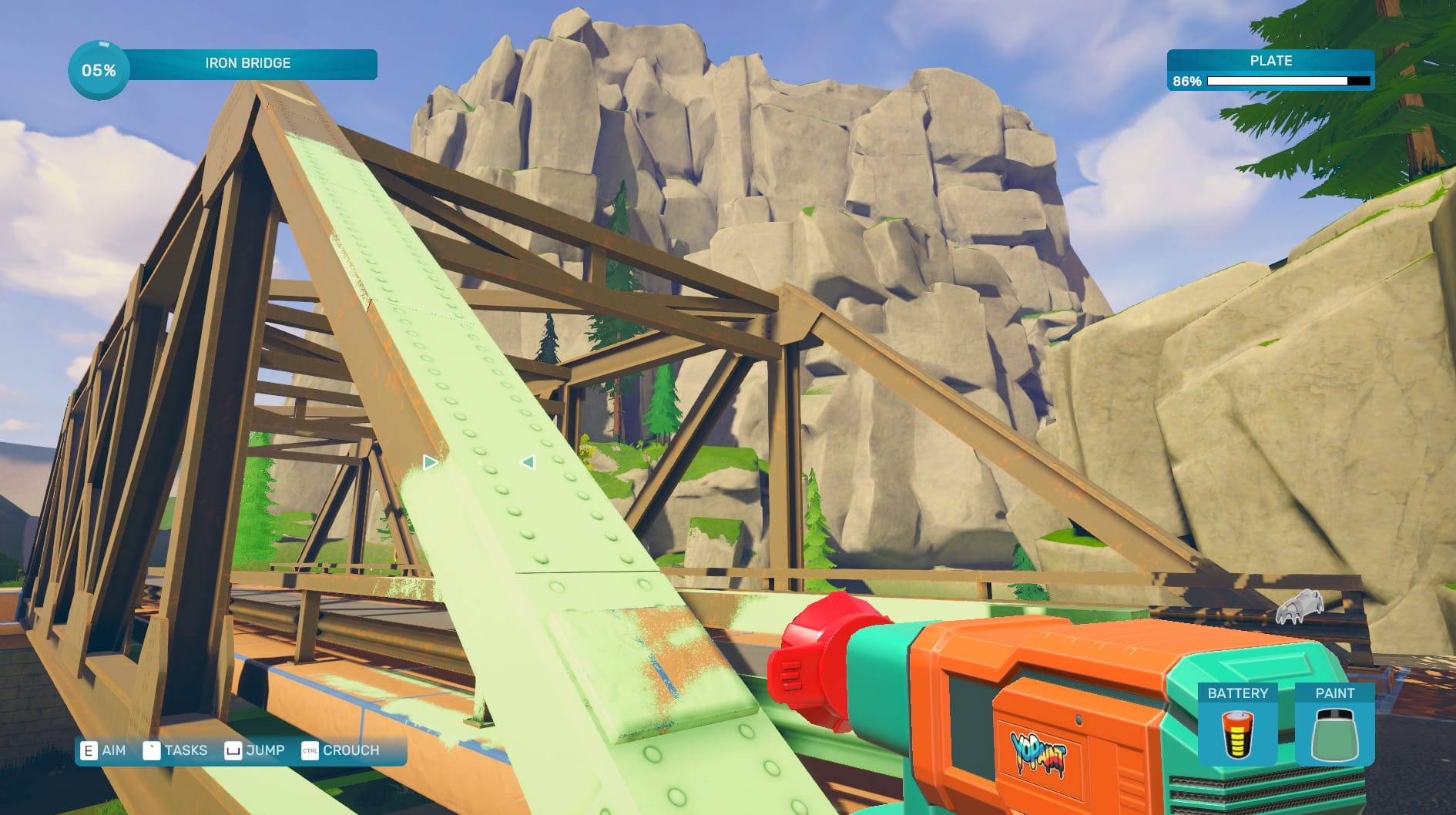
I’m not the only one who’s found themself completely swept away by PowerWash Simulator, American Truck Simulator, PC Building Simulator, House Flipper and the rest of the merry crew. I haven’t even delved into Farming Simulator (currently on its 25th iteration!) or Lawn Mowing Simulator – both of which, like flight simulators, are really trying to give you a more realistic and grueling experience than the light and silly PowerWash Simulator. Futurlab, makers of PowerWash Simulator, recently (2025/3/27) announced that the game has reached 17 million players across all platforms. When I first saw the title I thought it was a joke (like the legendary Goat Simulator) or some kind of weird abandonware (like the delightful but forgotten Elf Bowling). Happily, it’s neither– it turns out to be a hypnotic, colorful and utterly charming series of 3D levels where you, a power washer, just power wash grime and goo off increasingly strange places and objects. The entire soundtrack consists of shhhhhhhhhhh and pssssshhhh and then the dopamine-dispensing DING! when you’ve cleaned an object within an inch of its life. No music, no voices. Nothing between you and the psssshhh. Is this thrilling gameplay? Not remotely. Is this somehow FUN? Now there’s the real question.
Why have 17 million people installed this game and tried it out--even for a moment? Why Spray Paint Simulator (another UK-developed sim game, this one nearly a button-for-button clone of PowerWash Simulator– but painting, not cleaning), Crime Scene Cleaner, PC Building Simulator, and all these other things that look suspiciously like work?
The reasons for playing these low-pressure task simulators– what I would like to call Sandbox Sims rather than traditional city, flight or civilization sims– are pretty broad but actually dive directly into the reasons people play games at all. In my opinion, they speak to how games straddle the line between art and mindfulness.
ACTUAL LEARNING
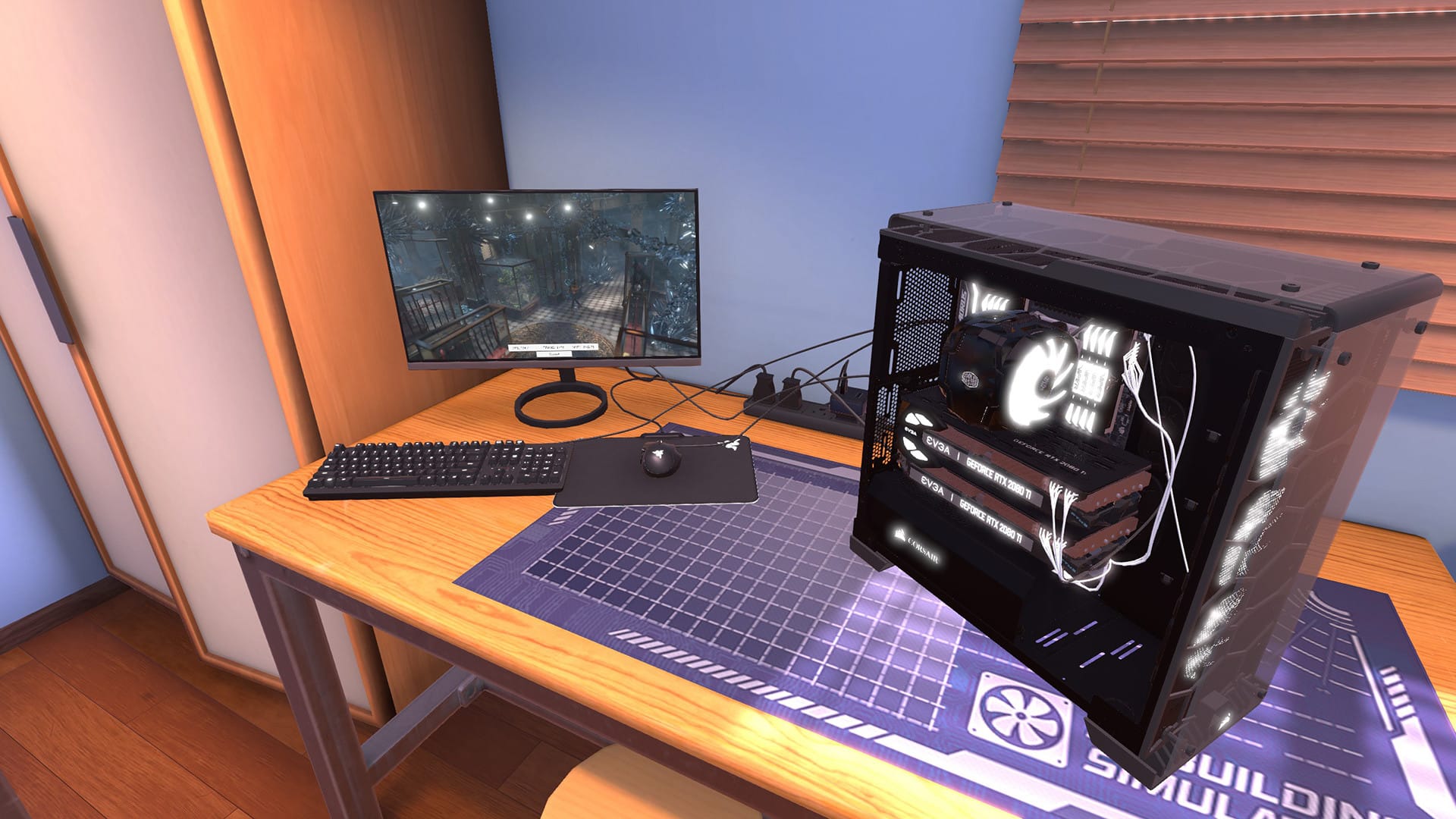
Sim games with a bit more ‘grit’– what I’m referring to as Traditional Simulators– tend to push the player to learn totally new mechanics in-game that are complex, interwoven tasks. This could be anything from pushing various levers to operate a tractor to actual hardcore flight training simulators. PC Building Simulator, for example, demands exactly what the name suggests– cleaning, wiring, slotting, soldering, and snapping PC parts together on a virtual desk. It’s faithfully rendered with enough detail that you, the player, ACTUALLY can learn a lot about how to clean, wire, slot, solder and snap together a PC. You have gained real-life-applicable experience through a gamified training simulator. The application of ‘virtual’ learning to real-life skills is so useful, flight simulators have been used by the military for decades. You could write a whole book about the benefits of gaining real skills in a virtual environment.
Of course, for those who just like assembling PCs, and already know how to wipe, solder, unscrew and unbox, this sort of game overlaps with…
FANTASY FULFILMENT
If you can’t afford the newest, biggest, bestest PC parts in real life, you certainly can in PC Building Simulator. If you’re a farmer who can’t afford an incredible combine harvester, maybe you come inside at night and play Farming Simulator 25 for the thrill of driving these machines you will never have a chance to ride around, rumbling your way across the landscape. If you’re a 34-year-old living in a tiny apartment in New Jersey with more plants than elbow room in your apartment, maybe driving the big bastard Scag Turf Tiger II across the beautiful British countryside in Lawn Mowing Simulator (Curve Games) is enough to lower your blood pressure and give you the fleeting sensation of owning a beautiful country home.
Work in an office, factory or local government branch? Then all I have to say is, “In Factorio you can set up a factory that is perfectly optimized to your own specifications within a couple of hours, with nobody arguing with you--” Sold!
CONCRETE, VISIBLE PROGRESS
One of the many aspects of game design that mostly exist under the hood is the importance of making the player feel that they are constantly making progress. This doesn’t mean constantly winning, necessarily, but it can-- see any of the most addictive lootbox, gatcha or other gambling-type games-- but a concrete sense of forward movement is a deep-set requirement for the human brain to feel like they’ve done something. They’ve MADE PROGRESS.
Different genres will approach this idea differently. JRPGs traditionally use character power levels, visible attribute statistics (Attack, Defense, Magic Defense, etc), and stockpiling currency. Later they added things like skill trees-- a highly visual roadmap of progress that not only shows where you’ve BEEN (like current character level) but also how far you have yet to go-- a goal-setting mechanic that is so intuitive it’s deceptively simple.
Most sims, both Traditional Simulators and Sandbox Sims, will set you up in the overarching game structure like a personal business. You’re a power washer, but you’re just getting started. You have one, weak little power washing gun, two little nozzles, and you can only take on small jobs-- like washing this tricycle, for instance. But after you complete this level, DING! you’ve gained some money. Some new items unlock-- soap! And a couple of newer, bigger jobs. You can’t wait to keep going and see if the new level is harder-- and if it’s a comfortable level of harder. If it is, you’re invigorated by the challenge and keep going. If it’s not, you hit Esc and Uninstall that bitch cuz you don’t have time for this.
In the internal game mechanic, especially for something like PowerWash Simulator or Lawn Mowing Simulator, you have visible progress within the level itself, in the most literal sense.
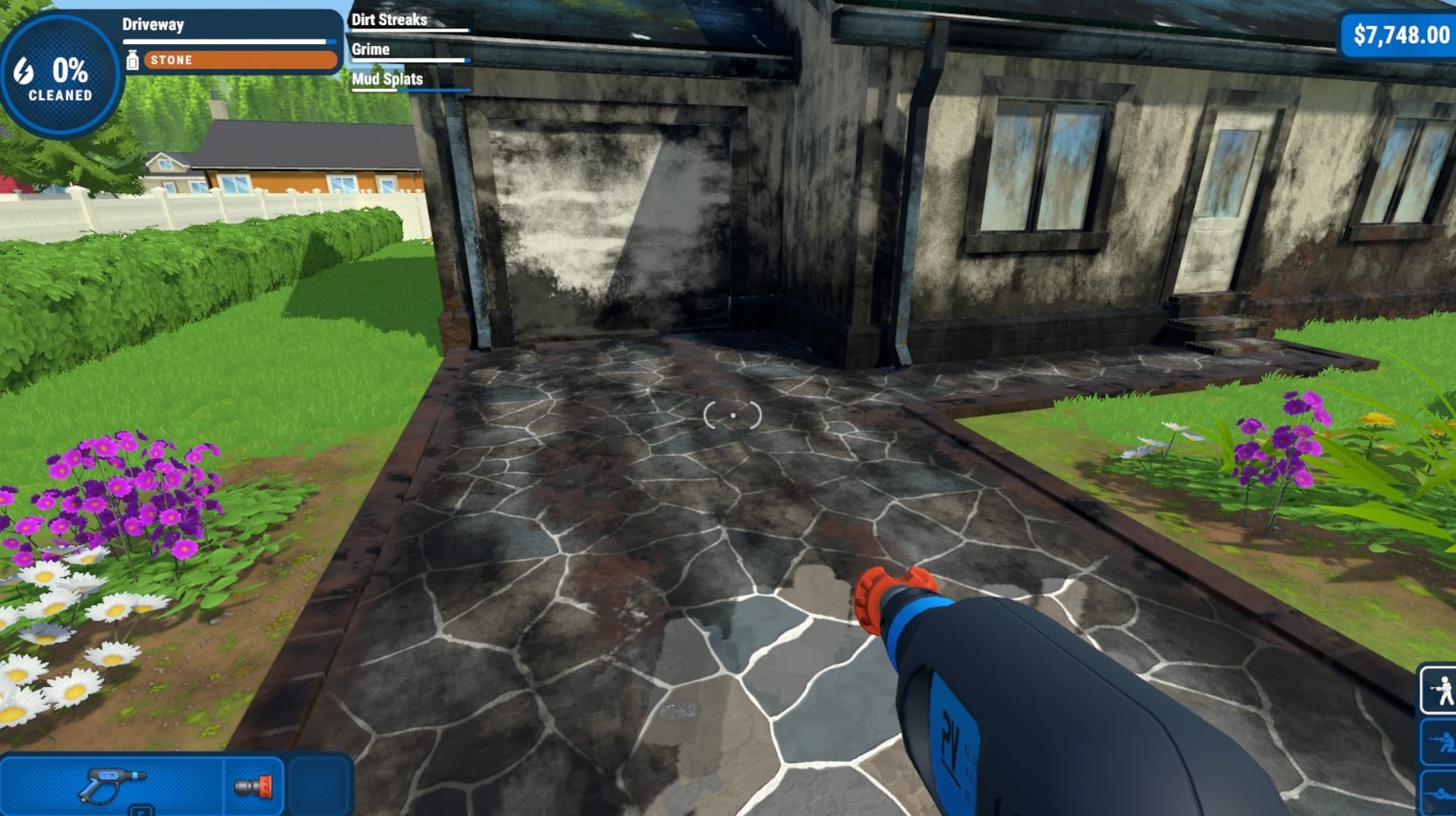
I have thought a lot about this particular point. Is it the dopamine response to watching Number Go Up, whether that’s a percentage marker, a completion bar, a sexy $dollar sign, or the slow erosion of dirt from a driveway? Is it our generation grasping at a sense of achievement that is largely missing from the horrible late-stage-capitalism grind of working (where one feels like a totally unvalued cog in a broken machine that serves no one), struggling to hold any possessions, buy a home, keep the car and kids functional; is it finding one little space in our life where we can look directly at it and say “I made progress here. I did something that met a goal today” ?
I hesitate to oversimplify so much, or make it sound like nobody is enjoying the game as a game, or that everyone is using it as a kind of mental crutch. Perhaps instead of ‘crutch’ I should say ‘refuge’; a space where we are totally in control. A space with…
CLEAR RULES AND REWARDS
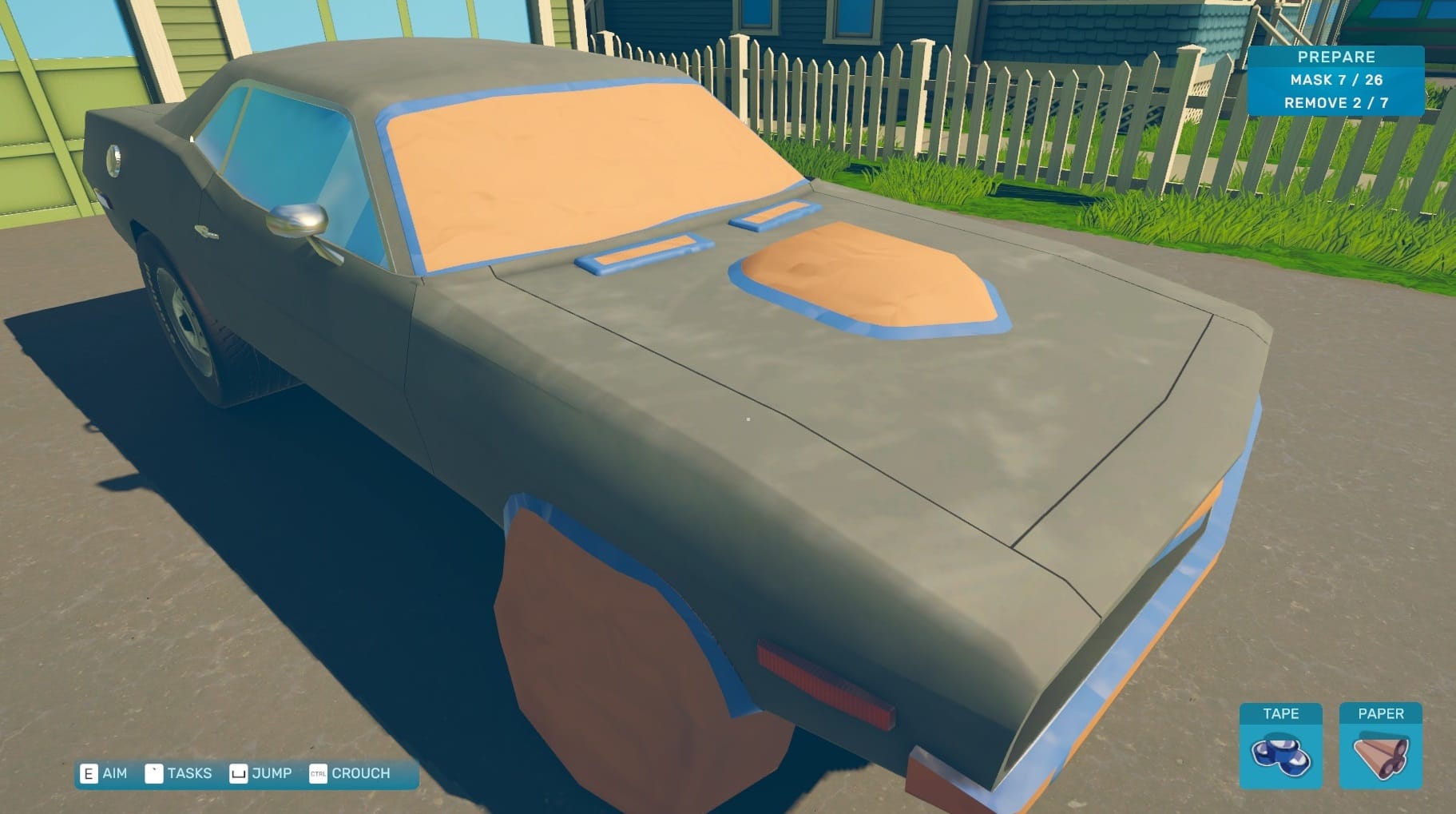
Humans are very weird creatures. For all the focus in Western cultures on rugged individualism and ‘going my own way’, the fact is that deep down we are comforted by order. Horror movies and books, in a very interesting way, are excellent examples of this. The usual horror story progression goes thus:
- A totally mysterious threat appears. It throws the natural order into chaos. Absolutely nobody knows what the fuck is going on. People panic.
- Someone, or a few someones, feel bold enough to approach the threat in a scientific manner. Is this a creature? A ghost? An alien? A human? Who is being killed, threatened, maimed, slimed, or possessed, and how?
- The important point of the movie: THE RULES ARE DISCOVERED. Horror stories always have a RULE. The rule might be somewhat incomprehensible at first, or very alien or alarming, but there is a RULE. “Don’t feed it after midnight.” “Shoot them in the head.” “They can’t climb glass.” “The Virgin always makes it out alive.”
- The intrepid characters now know the BOUNDARIES AND RULES of the story and try to function within the rules to survive or end the threat.
- Ooo, a twist! There’s a loophole! Holy shit!
- They outmaneuver the twist, loophole or holy shit. They use their human ingenuity to seal the ghost, trick the Devil or steal the relic. An epic showdown. Humanity is saved once again.
If you aren’t normally a fan of horror, I encourage you to revisit some staples of the genre (Stephen King is highly reliable) and look at it through this lens, the humanistic pattern of finding out what the rules are.
Job Simulators, especially Sandbox Sims, are brilliant for this, because there is very little story to get in the way. The rules are clear, communicated within seconds, and easily understood. Order is maintained. And in the case of sandbox sims where you are cleaning, washing, painting or repairing, you are also…
MAKING ORDER FROM CHAOS
When I was a kid I was an ADHD goblin that tied uncountable meters of yarn and string to everything I could reach, stuck stickers on surfaces, and drew on anything that stayed still long enough. I had drawings, posters, magazine pages and scraps of paper taped to every wall of my room. Crayons everywhere. Leaves in my hair. My immediate vicinity resembled nothing more than the house levels of Katamari Damacy.
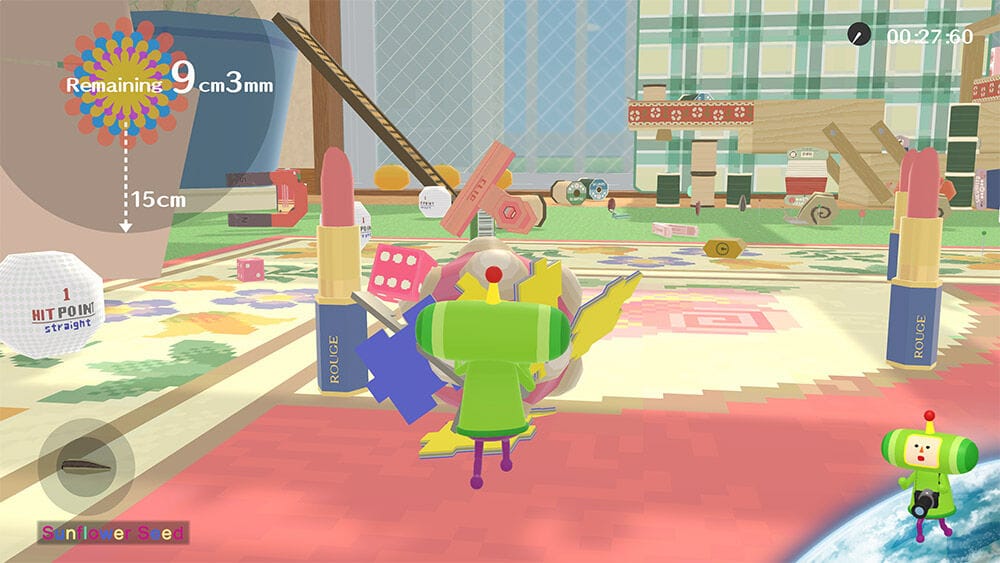
Thankfully, for both me and my parents, I grew out of it and like many adults of a Certain Age, I now get unreasonably excited by shopping for cleaning products. What could be better, really, than cleaning up a filthy town in PowerWash Simulator or mopping up gory blood splatters and picking up broken glass in Crime Scene Cleaner? While these tasks might seem tedious and weird to people who prefer Halo or COD, I think games about ordering, cleaning and beautifying speak to a certain kind of person– someone who thinks about themselves, about others, and about the community.
In PowerWash Simulator, the levels are presented to the player as jobs, requests for help that only you can do. The town is extremely, incredibly dirty-- as if the entire coal-mining county has exploded uniformly all over everything-- and the citizens just want their houses and vehicles cleared of goo and filth. Can you help? Will you donate your time to make sure every corner of the playground is perfectly sparkly clean? They really don’t mind if you draw dicks in the dirt first, whatever it takes.
Maybe it’s the monkey-brain that loves to pull little grubs out of holes or discover a shiny rock, but the slow powerwashing excavation of bright color and shimmer from glorpy, squishy layers of black dirt feels like gradually revealing your own mental ease and happiness from layers of sticky angst. DING!
FLOW STATE; OR, MINDFULNESS IN THE COMPUTER
University of California, Davis professor and researcher Richard Huskey wrote this piece on Flow State based on his research into communication, the brain, and how flow state benefits health and mental resilience. He notes that people who more easily access flow-state (mindfulness in a task, including a state of non-self) are better guarded against depression and burnout and have increased resilience. Flow state is also greatly beneficial for those with ADHD. I can see the correlation at once– if you have trouble focusing on tasks like cooking or reading, or find yourself constantly distracted by internal or external input, losing yourself in a task is like retraining your brain to ‘take a breath’.
I wouldn’t be surprised to hear that many people who struggle with stress, anxiety, ADHD or mindfulness in general find great relief through video games. They don’t have to be high-pressure platformers that “use up all your RAM”, though lots of players enjoy games with immense challenge for sure (see sales of Dark Souls!). Games with a consistent level of pressure, movement and required focus, like sandbox sims, can induce flow state almost effortlessly.
Personally I play games like PowerWash Simulator while doing something else mentally--listening to a podcast, thinking about the upcoming week, or working on a problem that needs more sustained thought. Sometimes I get so lost in the game I lose track of time and everything is pssssshhhhhhhhhh. Rather than feeling exhausted and angry when I finish, I feel refreshed and calm. The mental health boosts are tangible to myself and my spouse. And for the price of XBox Gamepass on PC, I can’t argue with the sustained benefit of meditation, mindfulness and focus.
Job simulators, sandbox sims, traditional simulators– however you want to finely split them, the genre that Sim City birthed is broadening monthly as more and more developers put out more or less complex and good-looking games that just give you a task to do – planting gardens, interior design, (quite a few of those) cleaning a kitchen after a horrible stabbing, throwing pots on a wheel, or just redecorating a foyer. They straddle a Venn diagram of artistic freedom, a sense of community duty (who let this park get so filthy??), and task-based progression. The next time you’re roaming around your apartment in a state of bored hangry irritation, instead of picking a fight on Reddit, first have a glass of water. Then maybe make some toast. Then maybe see if PowerWash Simulator is on sale on Steam, because PowerWash Simulator 2 is coming out soon. Let the psssssshhhhhh (and toast) soothe you--envelop you--- you are the psssshhhh, you are the rapidly-cooling toast. Take a slow breath. And just wait til you hear that ding!. You might not believe what happens next.
This article was written by a real human without any use of AI.
